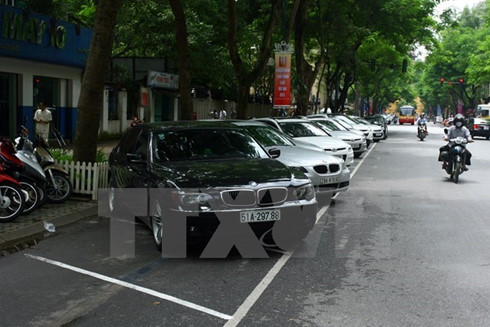Hanoi to pilot automated street parking
Thứ Hai, 20/03/2017, 15:28
An automated car parking technology will be piloted on two streets in the capital city in the second quarter of this year.
 |
Chairman of the Hanoi People’s Committee Nguyen Duc Chung has instructed the city’s Department of Transport to pilot the iParking technology for car parking management on Ly Thuong Kiet and Tran Hung Dao Streets.
The project is part of efforts to improve urban order by monitoring the number of vehicles using parking lots and preventing the lack of transparency in collecting parking fees, he said at a recent meeting with the city’s Steering Committee on Traffic Safety.Nguyen Tuan Duc, head of the department’s urban transport infrastructure division, said earlier last week that the concerned units, including the technology provider, have been informed of the project.
“We will try to finish the venue scouting and planning phrase by March 30 so we can start applying the new system on April 1,” he said.
Under the project, surveillance cameras will be installed at the parking lots, recording the number of vehicles, their parking duration and the number of parking slots available. The information will be relayed to a data processing centre.
A sensor device will be attached to the camera poles to read electronic parking cards and record vehicles’ information – such as license number, vehicle type, time-in and time-out.
Parking fees will be calculated based on parking duration, which vehicle parkers can pay in cash or via bank transfer.
“The system will inform drivers on the availability of parking slots on each street, which will not only help save time and resources but also reduce traffic,” a representative of the technology provider said.
The technique of angle parking has been piloted on Ly Thuong Kiet and Tran Hung Dao streets. However, since this takes up a large road surface area, the department plans to repaint the roads so vehicles will park straight along the streets under the new system, according to Duc.
The automated parking system would stabilise parking fees and gradually replace the traditional vehicle watching services, he said.
During the initial phase, the technology provider would transfer the technology and provide training for staff of the Hanoi Parking Company, he added. After that the system would be managed and operated by the city, he said.
There are currently some 1,100 parking lots in the city, and 200 of these operate on the roads with people watching the vehicles and collecting fees.
VNA

